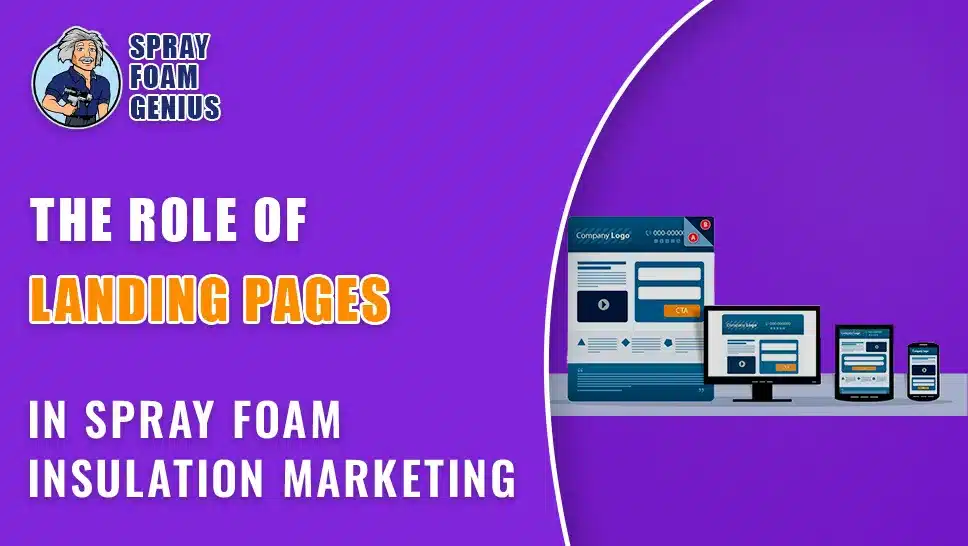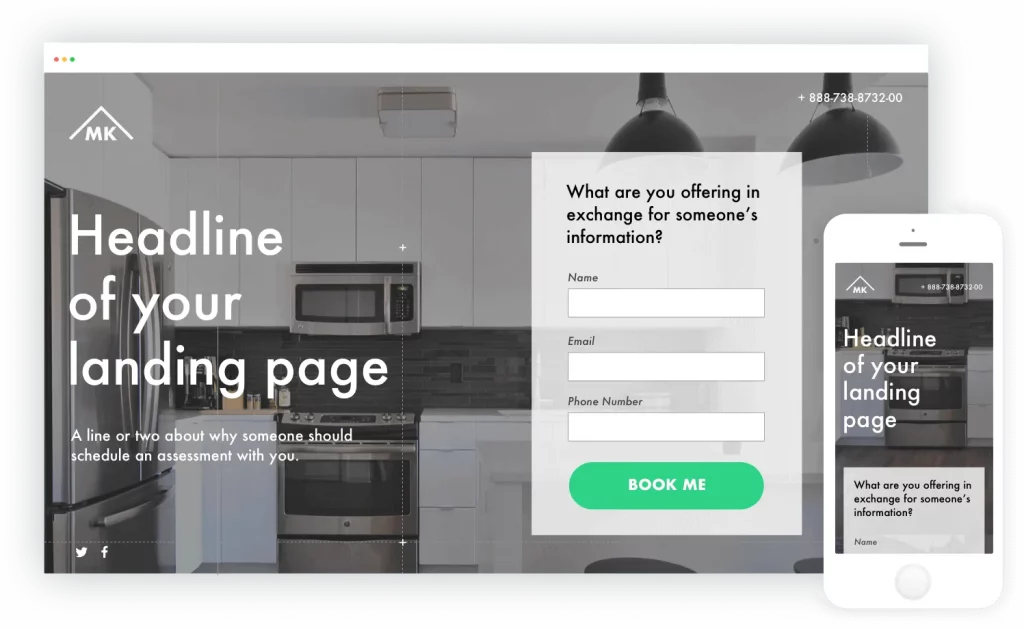
In the competitive landscape of spray foam insulation, effective marketing strategies are crucial for standing out and capturing leads. One of the most powerful tools in your digital marketing arsenal is the landing page. This essential component of your online presence can significantly impact conversion rates, drive targeted traffic, and ultimately grow your business. In this comprehensive guide, we will explore the role of landing pages in spray foam insulation marketing, providing actionable insights to help you optimize these pages for maximum impact.
What is a Landing Page?
A landing page is a standalone web page specifically designed to convert visitors into leads or customers. Unlike general website pages, which may offer a range of information and options, a landing page focuses on a single call-to-action (CTA). This could be anything from filling out a contact form, requesting a quote, or signing up for a newsletter.
Why Landing Pages Matter in Spray Foam Insulation Marketing

Targeted Engagement
In the spray foam insulation industry, your potential clients are looking for specific solutions to their insulation needs. A well-designed landing page allows you to tailor your message and offerings to address their unique pain points. By targeting these specific needs, you increase the likelihood of conversion.
Enhanced Conversion Rates
Landing pages are crafted with a singular purpose: to convert. This focus allows for optimized design elements, such as persuasive copy, compelling visuals, and clear CTAs, which collectively enhance conversion rates. According to HubSpot, companies with 30 or more landing pages generate 7 times more leads than those with fewer than 10.
Improved Lead Generation
Spray foam insulation contractors can greatly benefit from well-optimized landing pages as they can help capture valuable lead information. By offering enticing incentives such as free consultations or estimates, you can encourage visitors to provide their contact details, thus expanding your potential client base.
Key Elements of an Effective Landing Page
Clear and Compelling Headline
The headline is the first thing visitors see, and it should immediately convey the value proposition of your spray foam insulation services. A strong headline grabs attention and encourages visitors to stay on the page.
Example Headline: “Transform Your Home’s Insulation with Our Expert Spray Foam Solutions – Get a Free Estimate Today!”
Persuasive Copy
The copy on your landing page should clearly explain the benefits of your spray foam insulation services. Focus on how your services solve common problems, such as energy inefficiency or noise reduction. Use bullet points or numbered lists to make the information easy to scan.
Example Copy:
- Energy Efficiency: Reduce your energy bills with our high-performance spray foam insulation.
- Noise Reduction: Enjoy a quieter home environment by minimizing sound transmission.
- Environmental Benefits: Contribute to a greener planet with eco-friendly insulation solutions.
Strong Call-to-Action (CTA)
Your CTA should be prominent and clearly state what you want the visitor to do next. Whether it’s filling out a form, calling your business, or downloading a guide, the CTA should be compelling and action-oriented.
Example CTA: “Contact Us Now for Your Free Quote – Call 360-800-4500 or Fill Out the Form Below!”
Visual Appeal
High-quality images or videos showcasing your work or illustrating the benefits of spray foam insulation can significantly enhance the effectiveness of your landing page. Ensure these visuals are relevant and support your message.
Trust Signals
Incorporate elements that build trust with your visitors. This can include customer testimonials, industry certifications, and guarantees. Trust signals reassure potential clients that they are making a wise choice.
Example Trust Signals:
- Customer Testimonials: “See how our clients have transformed their homes with our spray foam solutions!”
- Certifications: “Certified by [Industry Body] – Quality you can trust.”
Form Design
The form on your landing page should be simple and easy to complete. Ask for only essential information to reduce friction and increase form submissions.
Example Form Fields:
- Name
- Phone Number
- Preferred Contact Time
Mobile Optimization
With a significant number of users accessing websites from mobile devices, your landing page must be mobile-friendly. Ensure that it loads quickly, is easy to navigate, and the CTA is easily clickable on smaller screens.
How to Optimize Landing Pages for SEO
Keyword Integration
Incorporate relevant keywords naturally throughout your landing page content. This helps search engines understand the page’s purpose and improves its visibility in search results.
Example Keywords:
- Spray Foam Insulation
- Insulation Services
- Energy-Efficient Insulation
Use of Latent Semantic Indexing (LSI) Keywords
LSI keywords add context to your content and help search engines understand the topic better. For spray foam insulation, LSI keywords might include terms like “insulation solutions,” “energy-saving
techniques,” and “home insulation benefits.”
Internal and External Linking
Include internal links to related pages on your website to keep visitors engaged and guide them through your content. External links to authoritative sources can boost credibility and SEO.
Example Internal Links:
- “Learn more about our Spray Foam Insulation Services.”
- “Check out our Customer Testimonials for more success stories.”
Example External Links:
- “Read more about the benefits of spray foam insulation on Energy.gov.”
Fast Loading Times
Ensure your landing page loads quickly to reduce bounce rates and improve user experience. Use optimized images and efficient coding practices to enhance loading speed.
Best Practices for Creating High-Converting Landing Pages
A/B Testing
Regularly conduct A/B testing on your landing pages to determine which elements are most effective. Test different headlines, CTAs, and images to see what resonates best with your audience.
Analytics and Tracking
Use tools like Google Analytics to track the performance of your landing pages. Monitor metrics such as conversion rates, bounce rates, and user behavior to make data-driven improvements.
Continuous Optimization
Landing page optimization is an ongoing process. Regularly review performance data, gather user feedback, and make necessary adjustments to ensure your landing pages remain effective and relevant.
Case Study: Successful Landing Page Implementation
To illustrate the impact of an optimized landing page, let’s consider a hypothetical case study of a spray foam insulation contractor who implemented these strategies.
Background
XYZ Insulation Solutions, a spray foam insulation contractor, was struggling to generate quality leads through their website. They decided to revamp their landing pages with a focus on targeted messaging and conversion optimization.
Actions Taken
- Redesigned Headline: “Save on Energy Bills with Our Premium Spray Foam Insulation – Get Your Free Estimate!”
- Enhanced Copy: Highlighted key benefits and used persuasive language.
- Improved CTA: Added a prominent button saying, “Request a Free Quote Now.”
- Visual Upgrades: Included before-and-after images of insulation projects.
- Trust Signals: Featured customer testimonials and industry certifications.
- Mobile Optimization: Ensured the page was fully responsive and fast-loading.
Results
Within three months of implementing these changes, XYZ Insulation Solutions saw a 45% increase in lead generation and a 30% improvement in conversion rates. The revamped landing page not only attracted more visitors but also effectively converted them into potential clients.
Effective Strategies for Promoting Your Landing Page
Leverage Paid Advertising
Use Google Ads or social media advertising to drive targeted traffic to your landing page. Ensure that your ad copy aligns with the message on your landing page for a cohesive user experience.
Utilize Social Media
Promote your landing page on social media platforms to reach a broader audience. Share engaging content and encourage your followers to visit your landing page for more information.
Email Marketing
Include links to your landing page in your email marketing campaigns. Craft compelling email copy that entices recipients to click through and learn more about your spray foam insulation services.
Maximize Your Results with Our Expertise
Creating high-converting landing pages is crucial for driving leads and growing your spray foam insulation business. At Spray Foam Genius Marketing, we specialize in developing and optimizing landing pages tailored specifically for spray foam insulation contractors. Our services include professional SEO, Google My Business optimization, local SEO, website development, lead generation, social media marketing, and reputation management.
Ready to take your landing pages to the next level and boost your conversion rates? Contact us today to learn how we can help you achieve your marketing goals.
Call us at 877-840-FOAM for USA and 844-741-FOAM for Canada visit our website at sprayfoamgeniusmarketing.com, or email us at [email protected] for a free consultation.
- Social Media Marketing for Spray Foam Businesses: What Works in 2025? - February 6, 2025
- Best SEO Strategies for Spray Foam Insulation Contractors to Rank #1 on Google - February 6, 2025
- What is Spray Foam Insulation? Benefits and Applications - February 5, 2025

